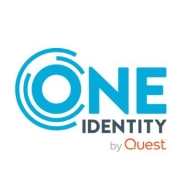

OneLogin by One Identity and One Identity Active Roles both compete in the identity and access management category. OneLogin excels in user-friendly interfaces and cloud capabilities, whereas Active Roles offers superior AD management and customization.
Features: OneLogin by One Identity provides single sign-on, multifactor authentication, and user-friendly role management, streamlining the onboarding process. Its SmartFactor Authentication enhances cybersecurity and supports remote work flexibility. One Identity Active Roles offers robust Active Directory management, automated provisioning, and a single pane of glass for hybrid environments. It includes dynamic groups, built-in workflows, and virtual directories for complex processes.
Room for Improvement: OneLogin could improve by expanding connector availability, enhancing real-time reporting, and offering more advanced two-factor authentication. Improvements in offboarding automation and customer support post-acquisition are also needed. Active Roles needs better web interface customization, increased scripting language support, and improved integration with cloud solutions. Users request more dynamic workflow templates and better workflow engine performance.
Ease of Deployment and Customer Service: OneLogin primarily operates in the public cloud, providing flexible deployment but mixed support experiences post-acquisition. Active Roles is usually deployed on-premises and is praised for its knowledgeable support team. Both products receive positive feedback on customer service.
Pricing and ROI: OneLogin offers competitive pricing with an active user licensing model, although some users have noted price increases. It provides significant ROI through time savings. Active Roles is considered expensive but delivers good value by streamlining operations and improving security, offering considerable ROI benefits.


One Identity Active Roles is a highly regarded solution for Active Directory (AD) security and account management. One Identity Active Roles will enhance group, account, and directory management while eradicating the need for manual processes. The end result is a significant increase in the overall speed, efficiency, and security of the organization.
Using One Identity Active Roles, users can:
Managing accounts in AD and Azure AD can be tremendously challenging; continually keeping these important systems safe and secure presents an even greater challenge. Traditional tools can be inefficient, error-prone, and very disjointed. In today’s robust marketplace, organizations are finding it somewhat difficult to keep pace with the constant access changes in a hybrid AD ecosystem. Additionally, there are significant security issues to consider (government compliance, employee status/access changes, and other confidential business requirements). And, of course, there is a requirement to properly manage Active Directory and Azure Active Directory access in addition to managing all the other numerous SaaS and non-Windows applications that organizations use today.
Users can easily automate all of these tedious, mundane administrative tasks, keeping their systems safe and error-free. Active Roles ensures users can perform their job responsibilities more effectively, more efficiently, and with minimal manual intervention. Active Roles was created with a flexible design, so organizations can easily scale to meet your organizational needs, today, tomorrow, and in the foreseeable future.
Reviews from Real Users
A PeerSpot user who is a Network Analyst at a government tells us, “It has eliminated admin tasks that were bogging down our IT department. Before we started using Active Roles, if one of our frontline staff members deleted a user or group, it could take several hours to try to reverse that mistake. Whereas now, the most our frontline staff can do is a deprovision, which just disables everything in the background, but it's still there. We can go in and have it back the way it was two minutes later. Instead of it taking two hours, it only takes two minutes.”
Becky P., Sr Business Analyst at George Washington University, shares, “In addition, with the use of workflows and the scheduled tasks, we were able to automate and centrally manage a number of the processes as well as utilize them to work around other product limitations. Those include, but are not limited to syncing larger groups, which have 50,000 plus members, to Azure AD. We sync up to Azure AD using ARS. If we had not already had ARS in place, it would have been impossible for us to have done so in the time period we did it in. We did it in under six months. ARS probably saves us at least two weeks out of every month. It's reduced our workload by 50 percent, easily.”
OneLogin by One Identity is a cloud-based access management solution for the modern enterprise. It delivers secure access for every user, every app and every device to meet an organization’s Workforce and Customer and Identity and Access Management (CIAM) needs.
OneLogin provides secure single sign-on, multi-factor authentication (supporting a wide array of passwordless authentication factors), adaptive authentication, desktop-level MFA, directory integration with AD, LDAP, G Suite and other external directories, identity lifecycle management and much more. OneLogin advanced authentication capabilities provide multi-layer, context aware and risk-based protection, minimizing the most common attacks and resulting in increased security, a frictionless user experience, and compliance with regulatory requirements. Furthermore, OneLogin’s user-friendly interface and streamlined design make it easy for end users and IT administrators to navigate the platform and remain productive.
We monitor all User Provisioning Software reviews to prevent fraudulent reviews and keep review quality high. We do not post reviews by company employees or direct competitors. We validate each review for authenticity via cross-reference with LinkedIn, and personal follow-up with the reviewer when necessary.